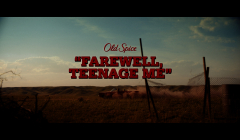
Old Spice waves farewell to boyhood in coming-of-age parody
The comedic campaign from Wieden + Kennedy positions Old Spice as a milestone marker of growing up

Environmental consciousness is fast becoming a part of decision making

The advertising industry's environmental impact has been under scrutiny for many years. And in the wake of COP28, the spotlight has never shone brighter. Businesses are gearing up to meet the rising demand for eco-friendly practices, adapt to changing regulations that hold them accountable, and recognise sustainability as both a moral obligation and a strategic advantage in the business world. And rightly so - because those who don’t will be left behind.
Environmental consciousness is becoming an integral part of consumer decision-making, and brands are facing increased pressure to align their strategies with sustainability goals. Looking ahead to 2024, marketers must recognise the value of catering to environmentally conscious consumers and understand that aligning with environmental values can enhance brand reputation, appeal to a broader audience, and contribute to long-term business success. It’s not just a nice-to-do anymore. It’s a need-to-do. Especially as more governments and international bodies place stricter regulations on carbon emissions and promote sustainable business practices.
But as more businesses shift to address this need, many may find it hard to make their communications cut through. This is where the creation of impactful and low waste content is imperative.
Prioritising the development of impactful and low waste content is crucial, as it serves as a catalyst for change, particularly in the realm of sustainability. By crafting messages that eliminate jargon and resonate both emotionally and intellectually with audiences, brands can cut through the noise, heighten awareness and spur action. Ultimately, this will help brands establish a genuine connection with their audiences by fostering trust and loyalty. This type of content also proves invaluable in communicating complex information while instilling a sense of responsibility in consumers.
Creating low-waste and impactful marketing content involves adopting environmentally conscious practices at every step of the content creation process.
Jessica Vo, Global Lead of Marketing Orchestration at RAPP
Creating low-waste and impactful marketing content involves adopting environmentally conscious practices at every step of the content creation process. Here are a few that businesses should consider:
The power of AI to help in this area mustn’t be overlooked either. If businesses invest in training employees to have a solid understanding of AI technologies, its applications and potential impact on sustainability efforts, AI could be transformative for the industry. Just one example of its many capabilities includes natural language processing and image recognition, which can streamline content creation processes and create more efficient workflows, reducing the need for excessive revisions and iterations. The result is a more streamlined content creation process that minimises waste, both in terms of time and resources. By harnessing the power of AI, businesses can optimise campaigns, reduce waste, and elevate the effectiveness of their strategies. We call this Content Intelligence.
And to create real change in the industry, collaboration is a must when it comes to AI-driven climate action. Data and insights must be shared with businesses, research institutions, and governments to accelerate the development and implementation of effective AI solutions. Ethical and sustainable AI practices must also be prioritised, ensuring transparency in how AI algorithms operate and make decisions. And responsible AI practices must be embraced to build trust with stakeholders and contribute to a positive impact on both the environment and society. With a strategic, informed, and ethical approach, businesses can harness AI's full potential to effectively address environmental challenges through education and collaboration.
We have manifested this idea in our content approach by using AI to work out which content works and which doesn’t. This means we can create meaningful content in the moments that matter and reduce linear content that isn’t used. We leverage AI to develop impactful, low-waste content, and are pioneering initiatives that resonate with eco-conscious consumers. Addressing climate change is not only a moral imperative but also a strategic advantage in meeting the evolving expectations of our clients and their target audiences. And I’m personally so excited about the prospect of AI driving innovation in our industry, enabling businesses to create content that not only captivates but also contributes to positive environmental outcomes.
Jessica Vo is a flexible and result-oriented visionary leader whose key focus is Marketing Orchestration; the transformative shift and approach towards how marketing synchronizes their teams, content, channels, workflows, and data. She has a proven track record of successfully leading and delivering effective transformations and centralisations for global brands across the automotive and luxury sectors. Her expertise includes developing data-driven strategies, managing complex production processes, and leveraging emerging technologies to create engaging and immersive brand experiences. With Content Production being at the heart of what she does, Virtual Production, Automation and Dynamic Experience are her key focuses for her clients at RAPP.
Looks like you need to create a Creativebrief account to perform this action.
Create account Sign inLooks like you need to create a Creativebrief account to perform this action.
Create account Sign in